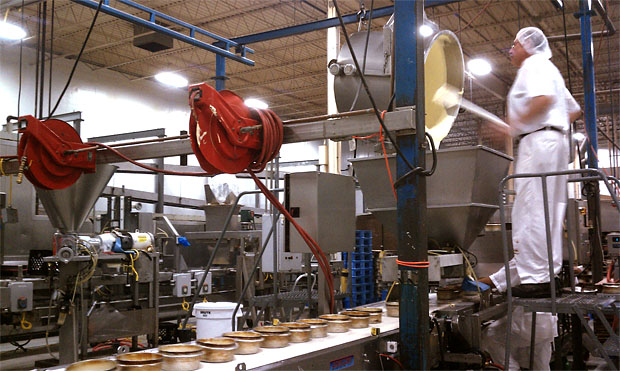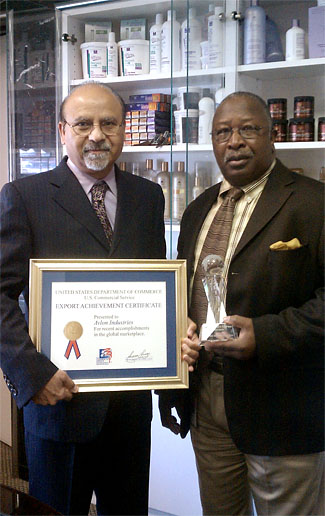Small businesses fuel Chicago exports abroad
By Niala Boodhoo

Small businesses fuel Chicago exports abroad
By Niala Boodhoo
Organizers of the NATO summit say one of the reasons Chicago is playing host is to help improve the city’s global image. But plenty of local companies are already doing business internationally. That fits perfectly with Gov. Pat Quinn’s ambitious goal to double Illinois’ exports by 2014. Niala Boodhoo looks at who’s behind the 64 billion dollars worth of goods Illinois exported last year.
It’s early morning inside Eli’s Cheesecake Factory on Chicago’s Northwest side. The aroma’s intoxicating. Owner Marc Schulman is giving me a tour, showing me dozens of cheesecake molds, waiting for batter.
“Each one of our cheesecakes is a cheesecake baked on a cookie,” said Schulman, who explains that workers have been baking those cookie crusts all night to prep for the dayside cheesecake making. Schulman breaks off a piece, pops it in his mouth, and with a full mouth, adds, “It’s very good!”
Schulman looks forward to NATO dignitaries eating Eli’s cheesecake in Chicago, they’ve already had it – at the military alliance’s headquarters in Brussels.
Cheesecakes became a core of Eli’s in the 1980s, more than a decade after Schulman’s father, Eli, opened his steakhouse in Streeterville. Today, exports account for about 10 percent of 3.5 million cheesecakes they make here each year.
“Our biggest market continues to be in England and it’s expanded from there to Saudi Arabia, to Russia, to Finland and now we’re working on a number of projects in Asia,” said Schulman. Everything is baked, shipped and packed from Chicago with the help of 260 employees.
Schulman says that’s especially true given how flat the local economy has been. Adding other markets into the mix is helpful for diversity.
“During the domestic slowdown the international business was really important,” Schulman said, adding that, at one point, international business was growing faster than domestic. “The important thing for a mid-size business is the flexibility.”
Julie Carducci works for the U.S. Department of Commerce’s Chicago office. She said today, there are many companies that from the outside, appear to be the same as they were 20 years ago but, like Schulman, they have added entirely new lines of business.
Last year, statistics showed export growth from Illinois up 29 percent, an “astounding” figure, said Carducci, especially since that was almost twice the average rate of national growth. (Interested more on national export data? Here’s some recent analysis from Brookings Institution).
Carducci considers many companies “reactive,” meaning they are simply responding to the demand for their products overseas. But Carducci said her agency’s also worked with American startups that hope to develop their entire customer base abroad.
“We see a lot of interest and there is a lot of demand for the up and coming markets of Turkey, Brazil, India and China,” Carducci said. “But really in one breath you say that, but then you say, ‘I have a lot of clients going to Africa,’ they have a lot of interest in the African markets.”
Soy is one of Illinois’s biggest exports. Next in line are services like architectural and design work and products such as machinery, electrical equipment and chemicals.

And the vast majority – as much as 90 percent - of those exports come from small to medium sized companies.
In west suburban Melrose Park, Ned Washington Jr. walks me through Avlon Industries, a hair care products company. The company won an Illinois Exporter of the Year award from the state earlier this year. The walls are lined with other awards (like one from the government of Jamaica), as well as reprints from Spanish magazines that wrote about Avlon’s product line.
“What we do is we look at texture of hair as opposed to cultural background,” said Washington, who directs sales for the company. Avlon is best known in the U.S. for its Keracare and Ferm hair relaxing products.
That’s sixty percent of Avlon’s market. But Avlon’s hair products also sold in 44 other countries – the biggest being Brazil, where the company has its own production facility. From Melrose Park, it also exports to the Caribbean, the Middle East and Africa.
Company founder Ali Syed is originally from Pakistan. Like Washington, he’s lived all over the world. Both men said that’s made it easier to do international business.
“Whereever we find our customers, we are going to go there,” Syed said. “We’re not going to limit ourselves to the U.S. That’s the great thing about America. You have this great infrastructure to develop, innovate and produce, and then you sell it out to the rest of the world.”
Syed points to data looking at the growth rate of economies overseas, especially in Africa. He knows that Africans’ disposable income is on the rise, and he expects Africans will soon want his hair care products as much as Americans do.
